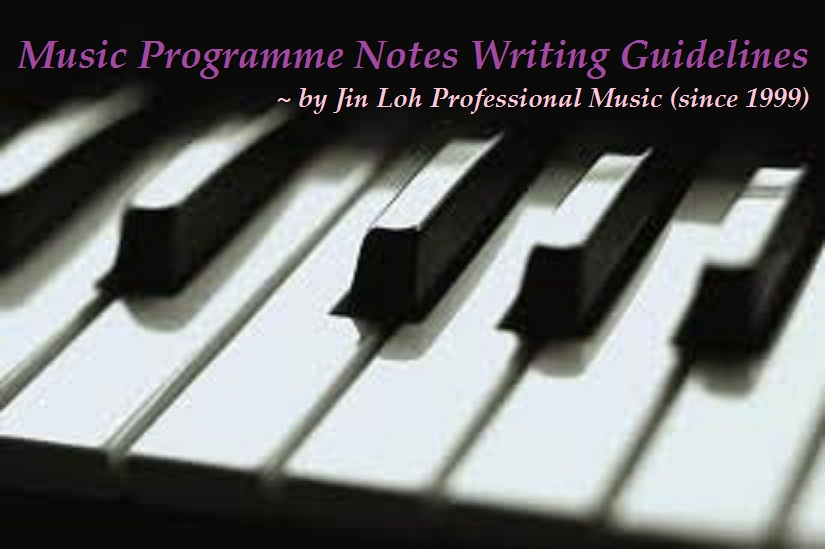日本語プロフィール:ジン先生は約6年間日本語を学び、いくつかの国際日本語試験に合格しました。

International Music Competition Judge
50+ Gold Prizes Won by Students
40+ International Teacher Awards
International Interviews (UK)
2025: Global Influential Times &
World Org. for Art & Design
2024: Beeffie Artist Award Org.
Discover what international winners say about learning under Ms. Jin Loh (watch video 2.5 mins)
Music Diploma Programme Notes Writing Guidelines


College of Music - Music Diploma Programme Notes

How to write ATCL/LTCL/FTCL/DipABRSM/LRSM/FRSM/LLCM/music diploma programme notes for music colleges? College music like the Trinity College London, London College of Music (LCM) and for music schools like the ABRSM (Associated Board of the Royal Schools of Music) exam boards, require music performance students to write a programme notes. This programme notes is part of the exam requirement.
Miss Jin Loh's music performance diploma students scored Distinctions in their diploma performance music exams. Most of her students scored Distinctions, e.g. 9/10 marks, 8/10 marks in their Programme Notes and Presentation Skills in their music performance diploma exams.
Below are some of the videos Miss Jin Loh has added recently in helping music diploma students to write their programme notes for college music like the Trinity London College, London College of Music (LCM) music diploma exams and music schools like the ABRSM music diploma exam.
For written guidelines on writing music programme notes, please scroll down to read further.

Part 1 of the Music Programme Notes

Title Page/Front Page on Music Diploma Programme Notes include:
- Candidate's/Student's Name (not to be included at all if students are taking ABRSM music diploma exams)
- Candidate ID number
- Musical Instrument
- Exam's full title
- Exam Date
- Exam Time
- Exam Venue
List out all the composers name in full, titles, movements and performing timings, that the student will be performing according to his/her performance order. Starting from the first piece that the student will be playing till the last piece, list out in order.
♪ Composer's full name: I.e. Ludwig van Beethoven (Use capital letter)
♪ Followed by composer's dates in bracket: I.e. (1770-1827)
♪ Insert a dash - after the composer's date in bracket
♪ List out the full title work in capital letter.
♪ Then insert a comma , before writing the opus or catalogue number.
♪ If the work has a nickname, insert a dash ' - ' after the opus/catalogue number, and write the nickname using '....'
♪ If there is any movements, list out the movements under the work title.
♪ The total performing time of each complete music work is listed in bracket, at the very last of the music work title.
- The written performing time need not be too precise, for example 5 minutes 36 seconds. It is better to write 5 minutes 30 seconds (5'30). It may be unrealistic during a live performance to finish performing exactly at 5 minutes 36 seconds .
Example of Programme List:
Ludwig van Beethoven (1770-1827) - Piano Sonata No. 23 in F minor, Op. 57 - 'Appassionata' (25'00)
i. Allegro assai
ii. Andante con moto
ii. Allegro ma non troppo
Programme Notes Guidelines:
- Print or type out the programme notes. Use only black ink for ABRSM music diploma exams.
- A5 paper or a folded A4 size paper is normally used to write diploma music programme notes. White or colour papers are ok.
- 2 copies of programme notes should be prepared for ABRSM diploma music exams.
- Programme notes is handed to the examiner at the start of the exam, together with all the photocopied pieces that the student will be performing, preferably using the same edition that the student will be playing. The programme notes and photocopied pieces would not be return to the student after exam.
- Word counts given by the Trinity College London/Trinity Guildhall and ABRSM music diploma exams, are the total word count for the whole written programme notes. Not including the words written on the title page/front page of the programme notes.
♪ OK to Include ♪
- photographs or illustration (that may beautify the programme notes)
- relevant quotation from other author/scholar/critics. (quotation mark and author's name must be included i.e. 'best piece..' described by Dr. Music.
NO/AVOID :(
- personal message or dedications for example, thanking your music teacher :) (not here...)
- any background about candidate/student
- bibliography/list of reference books
- footnotes
- qoutation from wikipedia
Click Watch How to Write Programme Notes - Part 1 Video
(General)

Click Watch How to Write Programme Notes - Part 2
(Programme Notes Front Cover Sample)
Music Diploma Programme Notes Word Counts for ATCL/LTCL/FTCL and DipABRSM/LRSM/FRSM
|
Trinity College London/Trinity Guildhall Word Counts ATCL Recital 400-700 words LTCL Recital 800-1,100 words FTCL Performance 1,200-1,600 words |
ABRSM (Associated Board of the Royal Schools of Music) Word Counts DipABRSM 1,100 words ±10% (990-1210) LRSM 1,800 words ±10% (1620-1980) FRSM 4500 words ±10% (4050-4950) |
Click Watch How to Write Programme Notes - Part 4 Video
(Programme Notes Word Count Limits)


Part 2 of the Music Programme Notes

Music Diploma Programme Notes may include:
- When the music work was composed, first published or first performed?
- Why the music work was written? Was it a dedication to someone special?
- Where the music work was composed or first performed?
- What happened to the composer's life, or in history, that lead to him/her to compose this music work ?
- Analyze and describe something interesting about the music work.
For example, legend said that Domenico Scarlatti received the inspiration to compose The Fugue in G minor, K. 30, L. 499, also known as the 'Cat's Fugue", from his pet cat called Pulcinella.
Progamme Notes Guildlines:
|
♪ Include ♪
|
NO/AVOID :(
|
Click Watch How to Write Programme Notes - Part 3
(Programme Notes Content Writing)

Click Watch How to Write Programme Notes - Part 5
(Programme Notes Exam Marking Criteria)
What is a Programme Notes?
Example of Programme Notes
Why Do We Need to Write Programme Notes?
♪ Read about Programme Notes & Presentation Skills Exam/Assessment Marking Criteria here ♪
♪ Read about Music Performances/Exams/Recitals/Concerts Attires (ATCL/LTCL/FTCL and DipABRSM/LRSM/FRSM Dress Code) Suggestions ♪



